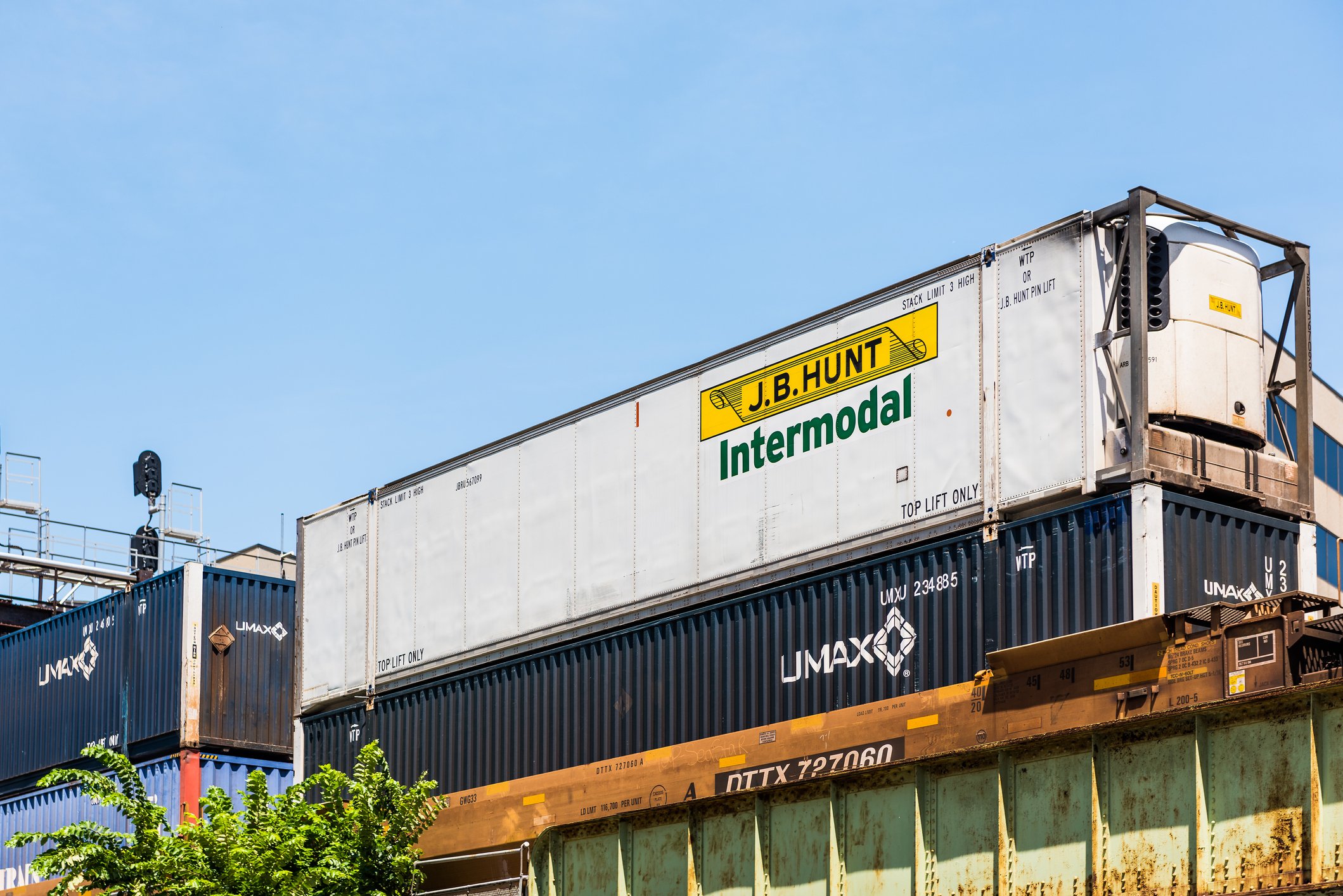J.B. Hunt Transport Services (JBHT +0.73%) released fiscal third-quarter 2019 earnings on Tuesday after the markets closed for trading. Prior to the filing, the performance of intermodal services was perhaps the biggest question hanging over the third-party logistics (3PL) provider's results. As we'll discuss below, the intermodal business generated solid, if not spectacular, numbers, but this was enough for investors to focus on other positive aspects of the report: Shares of the freight investment were up nearly 5% during the Wednesday trading session. Note that all comparative numbers in the discussion that follows are presented against the prior-year quarter.
J.B. Hunt results: A bird's-eye view
| Metric | Q3 2019 | Q3 2018 | Change |
|---|---|---|---|
| Revenue | $2.36 billion | $2.21 billion | 6.8% |
| Net income | $151.2 million | $131.1 million | 15.3% |
| Diluted earnings per share | $1.40 | $1.19 | 17.6% |
Data source: J.B. Hunt Transport Services.
Significant details from J.B. Hunt's third quarter
- Intermodal revenue increased 2% to $1.24 billion on flat volumes. As I discussed in my earnings preview, intermodal, which accounts for 50% of total revenue, exerts an outsize impact on the company's top line. After a year-over-year volume decline of 8% in the first quarter (due in part to rail operators' closures of underperforming routes), the current quarter's flat volume against Q3 2018 hints at a more normalized rail environment.
- Dedicated contract services (DCS) revenue jumped 28% to $696 million. Productivity (defined as revenue per truck per week) excluding fuel surcharges climbed by 11%. The Final Mile Services (FMS) business added $53 million to segment revenue during the quarter, or roughly one-third of DCS' year-over-year revenue growth of $153 million. FMS' contribution derived mostly from its February 2019 acquisition of Cory 1st Choice Home Delivery. DCS revenue also benefited from the addition of 1,277 trucks to its operations since the end of the third quarter of 2018.
- Integrated capacity solutions (ICS) continued to exhibit weakness, as revenue slipped 3% to $337 million. While volumes decreased by 4%, revenue per load inched up 2%. Management attributed the higher load revenue to a dip in contractual LTL (less-than-truckload) miles and a "competitive pricing environment" for contractual truckload business.
- In the company's truck segment, JBT, revenue fell 11% to $94 million. A 5% drop in rates per loaded mile, a compression in haul length of 2%, and a 3% dip in load count were all cited as factors behind the softer results.
- Management noted that the company's digital freight brokerage platform, "Marketplace for J.B. Hunt 360," which was launched last year, continues to see appreciable growth. The platform is currently on pace to reach an annual run rate of $1 billion in brokered transactions.
- The organization's operating margin improved 110 basis points to 9%, as it realized efficiencies in its biggest cost line item, "rents and purchased transportation," and benefited from lower fuel expense.

Image source: Getty Images.
Looking forward: Management's perspective
In J.B. Hunt's earnings conference call, CEO John Roberts informed investors that management intends to discuss strategic initiatives in more detail each quarter. In this vein, Roberts provided a high-level overview of each of the company's segments.
Roberts observed that rail lane closures were moderating, supporting the stabilization of intermodal volumes going forward. The CEO also disclosed that due to both acquired and organic growth in FMS, the business will be broken out as its own segment in fiscal 2020.
Robert's overview of J.B. Hunt's supply chain solution services (DCS) and trucking businesses included the following commentary:
The DCS accelerated its organic growth through the past two years, reaching unprecedented contracted expansion in unit counts and revenues. As expected, the implementation expenses related to strong growth have mitigated over time, and we expect the core business in private fleet services to return to targeted margin performance. We also expect continued organic growth in this channel of private fleet creation and conversion.
Highway services, including our truckload business and all brokerage services, continues to migrate to a more digital and lighter asset model, moving toward independent contractors and contract carriers with our capital focusing on the trailer fleets. They're exploring new and different ways to approach the trailer needs of our customers and carriers with the 360 [platform] programs and hope to find the right equation to expand this opportunity.
As we head into the fourth quarter and look ahead to fiscal 2020, J.B. Hunt boasts a number of growth opportunities, from its expanding Marketplace 360 platform to the utilization of additional truck capacity the company has added over the last year. At the next reporting period, however, investors will look for management's perspective on the external environment for the coming year, as Hunt's fortunes will depend in part on the strength of overall U.S. economic growth in 2020.





